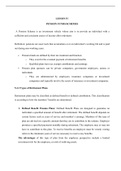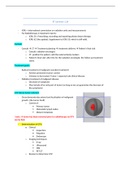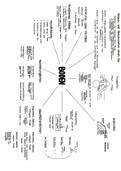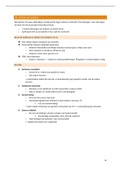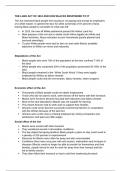LESSON IV
PENSION FUNDS/SCHEMES
A Pension Scheme is an investment vehicle whose aim is to provide an individual with a
sufficient and consistent source of income after retirement.
Definition: pensions are asset tools that accumulates over an individual’s working life and is paid
out during non-working years.
Pension funds are defined by their tax treatment and function.
o They exist for the eventual payment of retirement benefits
o Qualified plans have tax exempt contributions and earnings
Pension plan sponsors can be private companies, government employers, unions or
individuals
o They are administered by employers, insurance companies or investment
companies and typically involve the assets of insurance or investment companies.
5.4.1 Types of Retirement Plans
Retirement plans may be classified as defined benefit or defined contribution. This classification
is according to how the members’ benefits are determined.
1. Defined Benefit Pension Plans: Defined Benefit Plans are designed to guarantee an
individual a specified amount of benefit after retirement. The defined benefit depends on
certain factors such as years of service and member’s earnings. Members of this type of
plan are advised on a specific amount that they are to contribute to the scheme. Employer
promises a specified payments monthly during retirement. The employee may or may not
have to contribute to this plan. To receive benefits an employee must be vested; vesting
refers to the minimum years of service necessary to receive any benefits.
The advantages of this type of plan from the employee perspective include a limited
investment risk for the employee, no risk of outliving assets.
, the disadvantages of this type of plan include a lack of portability from job to job and a lack of
control over how pension contributions are invested, or even if the employer is contributing
enough to meet the promised obligations
The defined benefit schemes may be three categories:
Fully funded : when sufficient funds are set aside by the employer to meet promised payments.
Under-funded Pension Plan
Future pension obligations of a defined-benefit plan are uncertain because obligations are fixed
payments to retirees and payments depend on salary level, retirement ages and life expectancies
Over-optimistic projections (estimated rates of return) can mean inadequate cash
to cover obligations
High risk investments might be used to generate higher returns with varied results
Many companies are under funded for they were “pay-as-you-go” for many years
before funding began
Over-funded Pension Plan
When investment returns for defined-benefit plans perform better than expected, there are funds
in excess of the amount needed to meet obligations
A portion of the surplus can be credited to the income statement of a corporation
Encourages exchange of defined benefit for insured pension purchase (liquidation of
plan)
Drivers for reform in defined benefits
Cost Saving measures. Employer reducing open ended liabilities
Non contributory schemes . Employers who have been making contributions
alone are feeling the burden and see the need to involve employees
Low funding levels . less than the statutory required 80% caused by: Failure of
schemes to carry out actuarial reviews – formula were not revised leading to
PENSION FUNDS/SCHEMES
A Pension Scheme is an investment vehicle whose aim is to provide an individual with a
sufficient and consistent source of income after retirement.
Definition: pensions are asset tools that accumulates over an individual’s working life and is paid
out during non-working years.
Pension funds are defined by their tax treatment and function.
o They exist for the eventual payment of retirement benefits
o Qualified plans have tax exempt contributions and earnings
Pension plan sponsors can be private companies, government employers, unions or
individuals
o They are administered by employers, insurance companies or investment
companies and typically involve the assets of insurance or investment companies.
5.4.1 Types of Retirement Plans
Retirement plans may be classified as defined benefit or defined contribution. This classification
is according to how the members’ benefits are determined.
1. Defined Benefit Pension Plans: Defined Benefit Plans are designed to guarantee an
individual a specified amount of benefit after retirement. The defined benefit depends on
certain factors such as years of service and member’s earnings. Members of this type of
plan are advised on a specific amount that they are to contribute to the scheme. Employer
promises a specified payments monthly during retirement. The employee may or may not
have to contribute to this plan. To receive benefits an employee must be vested; vesting
refers to the minimum years of service necessary to receive any benefits.
The advantages of this type of plan from the employee perspective include a limited
investment risk for the employee, no risk of outliving assets.
, the disadvantages of this type of plan include a lack of portability from job to job and a lack of
control over how pension contributions are invested, or even if the employer is contributing
enough to meet the promised obligations
The defined benefit schemes may be three categories:
Fully funded : when sufficient funds are set aside by the employer to meet promised payments.
Under-funded Pension Plan
Future pension obligations of a defined-benefit plan are uncertain because obligations are fixed
payments to retirees and payments depend on salary level, retirement ages and life expectancies
Over-optimistic projections (estimated rates of return) can mean inadequate cash
to cover obligations
High risk investments might be used to generate higher returns with varied results
Many companies are under funded for they were “pay-as-you-go” for many years
before funding began
Over-funded Pension Plan
When investment returns for defined-benefit plans perform better than expected, there are funds
in excess of the amount needed to meet obligations
A portion of the surplus can be credited to the income statement of a corporation
Encourages exchange of defined benefit for insured pension purchase (liquidation of
plan)
Drivers for reform in defined benefits
Cost Saving measures. Employer reducing open ended liabilities
Non contributory schemes . Employers who have been making contributions
alone are feeling the burden and see the need to involve employees
Low funding levels . less than the statutory required 80% caused by: Failure of
schemes to carry out actuarial reviews – formula were not revised leading to

